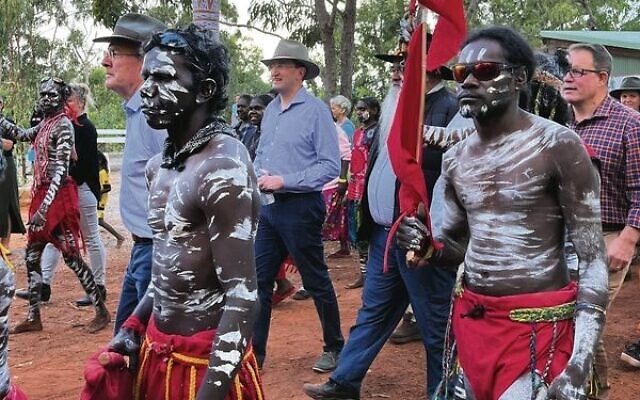A journey of empathy and empowerment
Reconciliation is a journey and I hope you will join me on this journey of empathy and empowerment.

In reconciliation week, we remember that Australians are all on a journey together.
As Noel Pearson insightfully observed, Australia has an Indigenous heritage, a British foundation and a multicultural character. These different chords make us strong and unique.
In Reconciliation Week 2023, we reflect on the practical and symbolic challenges before us as a country to achieve reconciliation.
At a practical level, it is clear that despite modest improvements, on too many socioeconomic fronts, the health, education, housing, safety and economic advancement of Indigenous Australians is going backwards.
The latest Closing the Gap Report which measures the social-economic progress of Indigenous Australians shows that we are failing on too many fronts.
Life expectancy and early childhood development milestones are not on track.
Successful partnerships are always about respect.
Indigenous housing is not where it needs to be, violence against Indigenous women and children is too high, and we are failing on adult incarceration targets and deaths by suicide.
Having visited Indigenous communities in Alice Springs, Ceduna, Aurukun, Leonora, Laverton, Arnhem land and Palm Island, I know that notwithstanding enormous goodwill and funding, the system is failing. In so many areas, Aboriginal and Torres Strait islander Australians do not have the same opportunities as other Australians. No matter where we all are in politics, there is agreement things must change.
I believe the key to change is found in partnership and through empowerment. It was Ken Wyatt, the first Indigenous person to hold executive office, who redesigned the Closing the Gap process to focus on partnership. A top-down approach to Indigenous relations doesn’t work. It never has, it never will.
Ken’s work meant that when it came to the critical work of Closing the Gap, the Commonwealth, along with the states and territories, worked in partnership with Indigenous groups.
Successful partnerships are always about respect. I believe we must work in genuine partnership and that means listening to Indigenous Australians rather than assuming that Canberra knows best. The best outcomes occur when we listen, show respect and appreciate each other’s unique human dignity.
This is what is at the very heart of the Voice. I believe the Voice can achieve two things in our national life. The first is that it is a way of achieving recognition for Aboriginal and Torres Strait Islander Australians who have loved this land since time began. This should be recognised in our Constitution. The second thing it achieves is that it creases a new structure to improve outcomes for Aboriginal and Torres Strait Islander Australians.
I believe that better policy is made when the very people affected by it are consulted on it.
As a conservative, I believe that if you empower people and move decision making closer to them, you see community building.
We see this in our own community. I say this without any disrespect to any earlier generation, but I believe it was the post-war generation of Jewish Australians that totally transformed our community. Many arrived in our country impoverished and traumatised, yet within a generation achieved something remarkable – by building community centres, aged care centres, hospitals, schools, kindergartens and welfare groups that will continue to serve for generations.
Through empowering people and by building institutions such as local and regional voices, we can shift responsibility and decision-making closer to people. This is more likely to shift the dial on Indigenous health, education, housing, safety and economic opportunity.
Unlike the overwhelming majority of national decisions, the decision on the Voice is not a decision for members of Parliament. It is a decision for you. At the referendum you get to choose.
I encourage you to get involved in this referendum. Everyone has a place in this discussion – because reconciliation is always about understanding another.
In seeking understanding we should draw from the lessons of our Jewish history.
I believe that better policy is made when the very people affected by it are consulted on it.
It is part of a bigger challenge for all of us – young and old, Liberal and Labor, Indigenous and immigrant, to be willing to walk a mile in another’s shoes. To be bigger people who see the best in each other – even when we disagree.
As Australians, no matter where we land in the coming referendum campaign, we need to find empathy for each other – and not just empathy for people who look “just like us”. I am reminded of the work of Dara Horn who hosts the podcast Adventures with Dead Jews.
One of the premises of the podcast is that we often find empathy when we see people “just like us”, but that is not true empathy.
Empathy is bigger. It’s not about accepting and embracing people because we can see ourselves in them. It is to stand with people and their right to dignity, freedom and self-expression when we can’t see the similarities. That’s not only the challenge of a referendum campaign, increasingly it is the challenge of being a thoughtful participant in a modern democracy.
Reconciliation is a journey and I hope you will join me on this journey of empathy and empowerment.
Julian Leeser is the federal Member for Berowra. The co-founder of Uphold and Recognise, he resigned from the Opposition front bench in April to campaign “Yes” in the upcoming Voice referendum.

comments